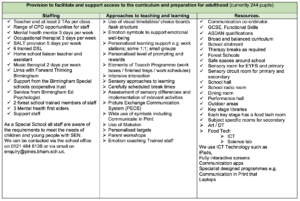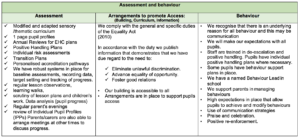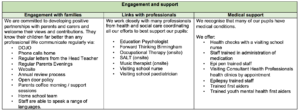SEND Information and Local Offer
What kinds of Special Educational Needs does the school make provision for?
The Pines is an all age special school with a Nursery class educating pupils with a diagnosis of Autistic Spectrum Condition (ASC) and associated learning and communication and interaction difficulties. Autism is the primary area of need. All students have a diagnosis of Autism Spectrum Condition; all have a Statement of Special Educational Needs and an Education, Health and Care Plan (EHCP).
The Pines is part of the Birmingham Special Schools Co-operative Trust and a Foundation School.
Extended and Main Class Rationale
The curriculum at The Pines School is founded on two distinct pathways extended and main. Whilst we recognise that pupils may make progress at a different rate, we still maintain high expectations and aspirations for all pupils. Opportunities for classes to join together are catered for where appropriate. The pupils in the Extended stream have a greater complexity of need and need a clearly differentiated approach to teaching and learning. As our most complex learners they are in a smaller group (maximum of 8 pupils) with 3 members of staff. Our main class pupils still require a specific approach to teaching and learning, however they are more-able to access whole group sessions and can access learning in a slightly larger group of 12 pupils with 3 adults.
The curriculum at The Pines School is founded on two distinct pathways extended and main. Whilst we recognise that pupils may make progress at a different rate, we still maintain high expectations and aspirations for all pupils. Opportunities for classes to join together are catered for where appropriate. The pupils in the Extended stream have a greater complexity of need and need a clearly differentiated approach to teaching and learning. As our most complex learners they are in a smaller group (maximum of 8 pupils) with 3 members of staff. Our main class pupils still require a specific approach to teaching and learning, however they are more-able to access whole group sessions and can access learning in a slightly larger group of 12 pupils with 3 adults.
Extended Curriculum Class:
- The majority of the pupils will be working within the P levels with some accessing the bridging the gap level.
- Pupils will have significantly limited functional language and communication.
- Pupils engagement is emerging or fleeting, they require a higher level of staffing to ensure progression in learning.
- Repetitive verbal and physical behaviours are frequent requiring a high level of support to regulate their emotions.
- Sensory differences impact on learning on a daily basis. Planned breaks for rewarding activities or activities to address sensory differences are planned for.
- Sensory processing and modulation leads to heightened anxiety levels.
- There are significant difficulties with short and long term memory, sequential memory and have limited working memory.
- Curriculum requires very specific and individualised differentiation, adaptation and modifications to account for difficulties pupils encounter in accessing learning.
- Pupils have bespoke learning plans that often incorporate therapeutic support and intervention such as structured and frequent learning breaks. The curriculum is based largely around physical and sensory learning activities that build on prior understanding and learning.
Main Curriculum Class:
- Pupils work through the P levels and over time are able to access National Curriculum expectations over time.
- Pupils will have limited functional language or communication, pupils use communication intentionally and seeks interaction although not always appropriate.
- Pupils engage for short periods of time on learning tasks with differing levels of support.
- Pupils need clearly defined roles and expected behaviour as they may lack understanding of classroom conventions.
- A higher level of support for emotional regulation and sensory needs at times.
- Curriculum requires very significant differentiation, adaptation and individualisation to account for difficulties pupils encounter in accessing learning.
- Pupils will make progress at a good rate from their starting point.
- Pupils will need to access an environment that is sympathetic to their needs, incorporating visual cues to enable them to make sense of the world around them and the expectations in place.




What kinds of Special Educational Needs does the school make provision for?
We run a variety of extra-curricular/enrichment activities for our pupils during lunchtimes given the constraints of transport. Pupils can access a residential trip in year 5/6 and year 9/10. Within the curriculum we try to ensure that there are a range of opportunities to bring learning to life, including community visits, theatre trips, trips to local places of interest (museums, libraries, exhibitions)
Transition
We know that transition for our students is a very complex area. There are 4 main elements to our transition work:
Transition to Foundation Stage – This usually includes a visit to school by parents, an observation at the child’s current setting where possible, and a visit to the home to gather information from the family and to share pictorial material which will support the child.
Transition during the school year – Arrangements for pupils who are admitted at other times of the year are made on an individual basis. If a pupil is coming to us from a different school, we will always visit them in their current setting and if possible attend their final review. A series of short visits into school then supports them in making a smooth transition into our setting.
Transition within school – Pupils are given several varied opportunities towards the end of the summer term to experience time in their new classroom with their new staff and pictorial material to support their understanding where appropriate.
Transition from school – Parent/carers of Pupils in Year 5 have discussions about their future hopes and aspirations for their child. This is replicated in year 11. They are given advice and guidance by school staff and there are opportunities to visit appropriate provision during the summer term of Year 5 and year 10. Once a child has been allocated a secondary place, or a college place we liaise with the new school to arrange for them to visit The Pines, for the child to have a series of supported visits to the new school and for staff to prepare handover materials around pupils’ learning styles and abilities prior to their secondary transfer. Visual materials are also provided for the child to enable them to understand and participate in the process.
What is the admissions procedure?
The Pines follows the Birmingham Cooperative Trust Admissions Policy for Special Schools. We do not directly admit pupils to school. Places at The Pines are allocated by the Birmingham SENAR Services. They allocate places based on being assessed as having an Autism Spectrum Condition, usually with additional complex learning difficulties and additional social and emotional difficulties. They will also all have a Statement of Special Educational Needs and an Educational Health Care Plan, prior to joining the school. Places are usually allocated as part of the Educational Health Care Plan process and within Band A3and A4 funding provision.
We welcome prospective parents and carers to come and look around the provision, however, you will need to work with the placement team in Birmingham SENAR Services to secure a place; this cannot be done directly with the school.
How can parents find the Birmingham Local Authority’s Local Offer?
Birmingham Local Offer: https://www.localofferbirmingham.co.uk/